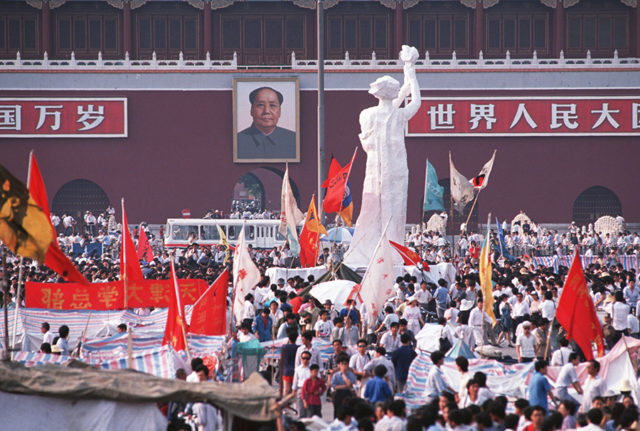Forty years ago, Ambassador Jeane Kirkpatrick wrote that a totalitarian’s “methods are as distinctive as his goals. He is…distinguished from other utopians by his willingness—no, his determination—to use state power to achieve these goals. …They understand…that revolutions are made by revolutionaries wielded into tight, purposeful organizations of dedicated zealots. …Organization, they agree, is the scientific instrument for the seizure of political power. Party is crucial.”
She gave America a lesson in the differences between Hitler and Somoza; Stalin and Khalid. Between authoritarians who, while surely not democrats, are different from totalitarians who require their people to absorb a new social/religious/world order and abandon traditional structures of family, religion, property and state.
It is an eerily apt description of China and Iran.
On the other hand, for more than 250 years, Americans haven’t talked much about ideology. Until recently, we relied on government mainly to protect our broad national interests, not to tell us what to think or how to be. Limited government and personal freedoms were baked into our governing framework. And our foreign policy has been largely transactional, conceding points to reach a deal. Until we can’t.
But what if a deal isn’t what China or Iran seek?
In a new book, journalist Josh Rogin cites a 2016 National Security Council memo. “China’s aspiration is manifestly not to settle for a balance of power with the United States, [it is] to achieve hegemony over its neighbors and the Western Pacific. …It stems from Party aspirations going back decades; Xi [Jinping] is merely accelerating the timeline.”
Miles Yu, a former State Department policy planning expert on China, told an audience that the problem with China is…China!
“The Chinese Community Party is the problem. Its ideological hostility toward the United States is based on a fundamental antagonism toward freedom, especially freedom for Chinese people. …The idea of a new ‘Cold War’ is not about U.S. ‘rhetoric.’ It’s never been U.S. policy. Hawks and doves come and go in Washington. But the very existence of the free United States is seen as an existential threat by the [Chinese Communist Party].”
They understood that China’s military buildup is defensive in its own eyes, requiring the surveillance state and the disappearance of Chinese scientists, journalists and medical information from Wuhan. It requires the crushing of Hong Kong, the recapture of Taiwan and genocide against the Uyghurs. To keep the population quiescent and warm, China announced 43 new coal-fired power plants, making a mockery of “climate czar” John Kerry’s abandonment of the Uyghurs in the hopes of finding agreement on emissions. “Life is full of tough choices,” Kerry told an interviewer.
Not for China.
In Iran, the mullahs are committed to Shiite hegemony—in the region, over Islam and over the world. A permanent state of war exists with the West in general, and with Israel in particular. Draconian behavior inside Iran, the spread of militias across the region and the drive for nuclear and ballistic missile capability are necessary in their eyes. Nuclear weapons are both an offensive capability and a means of ensuring that the U.S. will not overthrow the regime as it did Muammar Gaddafi and Saddam Hussein (although Tehran was thrilled by the latter).
How can a largely transactional country deal, then, with ideologically driven adversaries? First, recognize the difference. Then, work with allies to stymie the most malign behaviors of Iran and China, both politically and economically. Reduce the role of Chinese “students” and scientists in American institutions. Compete directly on technology and rare-earth mining. Enforce lapsed sanctions on Iran. Protect ourselves and our allies. Restore the U.S. Navy. Bring Taiwan into a coordinated relationship with Japan. Promote and foster the Abraham Accords, grounded in part in the realization of the participants that Iran threatens all of them. Restore America’s short-lived energy independence by reopening the Keystone Pipeline and supporting changes in energy policy—including the role of nuclear energy.
Finally, say what you mean. Secretary of State Antony Blinken touched the edges of American ideology recently, saying the U.S. would “push back against attempts to subvert the ideals upon which the (UN) Human Rights Council was founded, including that each person is endowed with human rights and that states are obliged to protect those rights.”
Sorry, Mr. Secretary. That is the principle on which the United States was founded. It was our Declaration of Independence that said, “All men are created equal, that they are endowed by their Creator with certain unalienable Rights, that among these are Life, Liberty and the pursuit of Happiness.” Inherent rights—those not provided by a government that can change or take them away—should have been enunciated by the secretary as the American principle for doing business.
The antithesis of the totalitarian ideologies of China and Iran, America’s founding principles of individual liberty and limited government have guided us and improved us for centuries and inspired millions around the world. The Goddess of Democracy from Tiananmen Square wasn’t a random statue.
With that understanding, let’s proceed accordingly.






